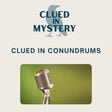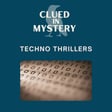Become a Creator today!Start creating today - Share your story with the world!
Start for free
00:00:00
00:00:01

G.K. Chesterton (part 1)
This week, in the first of two episodes about G.K. Chesterton, Brook and Sarah look at his life and find out why he was such a fascinating man and the influence he had on literature and life in the early 20th century.
Discussed
Orthodoxy (1908) G.K. Chesterton
Chesterton's work on Project Gutenberg
Radio adaptations of Father Brown
For more information
Instagram: @cluedinmystery
Contact us: hello@cluedinmystery.com
Music: Signs To Nowhere by Shane Ivers – www.silvermansound.com
Website
Transcript
Transcript
Introduction and Personal Updates
00:00:11
Speaker
Welcome to Clued in Mystery. I'm Sarah. And I'm Brooke, and we both love mystery. Hi Brooke. Hi Sarah, it's so good to be speaking with you again. Yeah, we took a little break, which was nice to just catch up on some reading and I managed to go away for a few days to the UK, which was also really nice.
00:00:34
Speaker
Yeah, that's wonderful.
G.K. Chesterton's Early Life and Interests
00:00:36
Speaker
And today we're revisiting one of our favorite types of episodes, which is looking back at one of the influencers on the genre. Today we're going to talk about GK Chesterton. So I'll start us off.
00:00:50
Speaker
Gilbert Keith G.K. Chesterton was born on May 29, 1874 in London to Edward Chesterton and Marie Grosjean Chesterton. His parents baptized him into the Church of England, although his family were irregular attendees of the Unitarian Church.
00:01:08
Speaker
According to his autobiography, as a young man, he became fascinated with the occult and seances. Along with his brother Cecil, they experimented with Ouija boards. Perhaps this contributed to the paranormal features he sometimes included in his mystery stories.
00:01:26
Speaker
Chesterton was educated at St. Paul's School. He always had an interest in art and studied both art and literature at separate universities. However, he did not graduate from either program. Chesterton married Frances Blogg at the age of 27. The couple was unable to have children but shared a long and happy marriage that lasted until his death.
00:01:47
Speaker
It is said that he was a very absent-minded fellow, and legend has it that he did most of his writing on the train since he usually missed his stops and would have lots of idle time to work.
Career Beginnings and Literary Influence
00:01:59
Speaker
His wife is said to have kept his social and work calendars for him to ensure he made his obligations.
00:02:06
Speaker
His knowledge of art and literature led him to work in publishing houses and eventually as a freelance art and literature critic. He began work in this capacity for the Illustrated London News in 1905 and worked there for the next 30 years. He's been referred to as the Prince of Paradox. Of his writing style, Time Magazine observed,
00:02:36
Speaker
As an example of this is an endearing quote from Chesterton. He says, the Bible tells us to love our neighbors and also to love our enemies, probably because generally they're the same people.
00:02:50
Speaker
Chesterton considered himself primarily a journalist. He wrote over 4,000 witty and thought provoking newspaper essays and a weekly column for more than a decade. And he even edited his own newspaper GK's Weekly. So this means he wrote a critical essay every day for 11 years straight. Very impressive.
00:03:14
Speaker
During his lifetime, he was primarily known for his theological and philosophical writings, including essays, articles, and poems. As a Christian apologist, his essays and speeches defended the Christian faith, influenced social justice, and encouraged others to live moral yet thoughtful lives. Chesterton was even nominated for the Nobel Prize in Literature in 1935.
00:03:38
Speaker
However, Chesterton was also having fun and making money by writing mysteries.
Father Brown and Mystery Writing
00:03:43
Speaker
He wrote 53 short stories between 1910 and 1936 featuring Father Brown, a priest and amateur detective who solved mysteries and crimes using his astute intuition and uncanny understanding of human nature.
00:04:00
Speaker
It is believed that the character is loosely based on Reverend John O'Connor, who was involved in Chesterton's conversion to Catholicism in 1922.
00:04:10
Speaker
As a mystery author, Chesterton was a founding member of the detection club and served as the first president presiding over this prestigious group of authors from 1930 to 1936. In case you missed our episode in season one all about the detection club, this was an organization of golden age mystery authors who met for regular dinners, helping each other with technical aspects of their individual writings and generally having a great time together.
00:04:39
Speaker
They also wrote collaborative mysteries and agreed to adhere to member Ronald Knox's fair play commandments. G.K. Chesterton stood six feet four inches tall or 1.9 meters and weighed around 130 kilograms or close to 300 pounds. His large stature didn't bother him though and true to his witty fun-loving nature
00:05:03
Speaker
He would often joke about his size. At one time, poking fun at his very thin friend George Bernard Shaw, Chesterton said, to look at you, anyone would think a famine had struck England. Shaw replied, to look at you, anyone would think you caused it.
00:05:22
Speaker
Some of his other famous friends include C.S. Lewis, J.R. Tolkien, Dorothy Sayers, H.G. Wells, and Hilaire Bellock. Chesterton died of congestive heart failure in 1936 at the age of 62.
00:05:37
Speaker
He was at home with his wife Francis by his side. His Requiem Mass was held at Westminster Cathedral. Ronald Knox delivered the sermon and noted, All of this generation has grown up under Chesterton's influence so completely that we do not even know when we are thinking Chesterton.
00:05:57
Speaker
At the time, Chesterton was internationally famous and his unexpected death shocked the world. The short funeral procession had to be lengthened by several miles in order to accommodate all those who came out to pay their respect. Several societies exist today which carry on his theological teachings. The Chesterton Society is seeking to have him canonized.
00:06:21
Speaker
So Sarah, I'm wondering how much you learned about Chesterton in school or as you studied authors of his time, such as Lewis or Elliot, George Bernard Shaw.
Influence on Contemporary Authors
00:06:31
Speaker
To me, he seems to have been lost to us a little bit. I agree, Brooke. I don't think I knew very much about him at all until we started the podcast and kind of in that episode in the first season, like you mentioned about the detection club, he obviously came up then.
00:06:48
Speaker
And I knew that he'd written the Father Brown stories, but apart from that, I knew very little about him. So thank you for that excellent overview of his life. He sounds like he was just an absolutely fascinating individual.
00:07:05
Speaker
absolutely yes oh and you're so welcome it was so much fun looking into him something that jumped out at me um when they talked about him being the prince of paradox and like the way he could turn a phrase and make you look at two sides of a situation
00:07:20
Speaker
that he was a bit of a paradox himself as a man, even so in that he was apparently they called him a quote unquote slow learner, which I think in our day, we probably would have discovered that he had a learning disability, but he didn't read until he was almost eight years old. And he would joke that his he he joked about being almost like considered asleep in his primary school age.
00:07:50
Speaker
But I think that that is so interesting as then someone to go on and be an amazingly prolific writer and profound thinker. So lots of paradoxes for this fellow.
00:08:05
Speaker
Yeah, that's really interesting because the little bit that I've read about him in preparing for this episode certainly suggested that he was extraordinarily well-read and well-versed in so many subjects. If you think about all of the different things that he wrote about, right?
00:08:28
Speaker
He wrote extensively about other authors and literature, philosophy, religion. He developed an economic theory, which is just incredible. Yeah. The subjects that he tackled and then, as you say, writing about other people's writing in the very critical thought-provoking way he did is
00:08:58
Speaker
I don't know. I think I feel like it's sort of unparalleled, especially at least in the people that I've studied. I would agree. And and he was obviously very well respected if the detection club elected him as the first president. Right. And I think, you know, he was close friends with a lot of the members of the of the detection club.
00:09:24
Speaker
But then also with other like really high profile authors and other high profile individuals. So he just he sounds like one of those people that you would have him on kind of every guest list for every important event.
00:09:40
Speaker
I think so. He seems like he was very humble. You hear some of these comments and very jovial, his interactions with other people. He was such a revered thinker and writer, but he
00:09:57
Speaker
It seems like it didn't go to his head. There's even a quote of him talking about the terrible mysteries that he wrote. He was making fun of his own work in comparison to the work of some of his colleagues that were in the detection club. He just kind of always made himself just very relatable and down to earth.
Philosophical Approach and Accessibility
00:10:17
Speaker
I think that his writing felt that way too, even when he is explaining philosophy or theology.
00:10:24
Speaker
You know, although I didn't dive in and read a lot of that work of his, the comments are that he was making it accessible to everyday people. And that's why he would use allegory or, you know, well-known proverbs or something like that so that he could illustrate these points that he wanted to make. So I just think that he seems so likable. No, I would agree with that.
00:10:50
Speaker
And yeah, I was thinking, you know, there's the question of, you know, if you could have dinner with anybody or, you know, six, six people, who would they be? I think I would add him to my list. Like, I think he sounds like he just would be a really fascinating person to have a conversation with.
00:11:06
Speaker
Yes. And I think he would be the person at the table that could get everybody involved. Like I see him as like drawing people out and being able to meet anyone where they are and have a great conversation, sort of the MC or moderator of the table. I would definitely love to have a conversation with him, although we don't necessarily have his name on the tip of our tongue.
00:11:30
Speaker
He influenced heavily C.S. Lewis, T.S. Eliot, J.R. Tolkien. One of his famous pieces of philosophical literature that he wrote is called Orthodoxy. And Ryan Reeves, who's a Cambridge professor, said, Orthodoxy is the philosophy behind the fiction of C.S. Lewis and J.R. Tolkien. So I thought that was so interesting to think about some of his
00:11:57
Speaker
work as being kind of the underpinnings of these fictional worlds that were very familiar with, with Narnia and with Lord of the Rings and things that they had read Chesterton in order to create their worlds.
00:12:16
Speaker
Mm hmm. Yeah, no, that's that is very interesting. And, you know, when I think about kind of what was happening at the time that he was writing, what was happening socially and politically, I think there's some parallels to what is happening now in terms of like.
00:12:36
Speaker
I think that's a fascinating point because it was such a turning point. The world was changing in such large ways and somebody like him could help people navigate it
Modern Relevance and Legacy
00:12:51
Speaker
and put
00:12:51
Speaker
you know some parameters around it and maybe how do we think about this because our whole world is changing and yeah that's really fascinating and I wonder if there's going to be someone who. Does that for us at this point I can't think of that person.
00:13:07
Speaker
No, I was wondering the same thing and trying to think, OK, well, who do we turn to for that interpretation of what's going on and that guidance? And I don't know if I can identify anybody.
00:13:31
Speaker
which is interesting. But yeah, he seemed to have his, he seemed to, I don't think this is quite the right way to describe it because it's not that he was directly involved in all of these things, but he did seem to have his fingers in a lot of pies.
00:13:47
Speaker
Yeah. And it doesn't necessarily, although he was coming from a very religious standpoint, it wouldn't necessarily be that, um, it wouldn't have to be in that category because what ended up happening was that then the fiction took it on, you know, like he created this framework and then even Lewis and Elliot and Tolkien were then using that to continue to shape because those,
00:14:15
Speaker
Stories are allegory right they are helping people put their minds around. Societal changes or how we treat other people of different cultures and there's like all sorts of messages interwoven in there so yeah i love thinking about things like that.
00:14:36
Speaker
Yeah, no, I think it's really interesting. And I think it's, you know, I think one of the many hats that he wore was being a crime author. But it's nice that, you know, that that is one of the hats that he wore and a lot of the messages that he was conveying were through his crime writing.
00:15:04
Speaker
Exactly, exactly. The same idea, the same notion of being able to comment on society or issues happened in his Father Brown stories 100%. And I think also he shared sentiments of his religious beliefs through those stories as well. And not at all in a pushy or preachy way, but you definitely got a sense of like who he was spiritually through those stories and super interesting.
00:15:34
Speaker
Well, and I think it's really interesting that he didn't actually convert to Catholicism until sometime after he'd started writing Father Brown stories. So that's an interesting trajectory that he followed to start writing about a character and then eventually join the religion that that character belonged to.
00:16:01
Speaker
Yeah. Isn't that interesting? I thought, found that point fascinating as well because, um, and here's to be able to do it convincingly before actually converting to that religion, I think says a lot about, you know, his level of knowledge of all things. But, um, yeah, that was, that was an interesting point that I didn't realize either.
00:16:22
Speaker
I read part of Martin Edwards' book about the Golden Age of Murder and because Anthony Berkeley was behind kind of one of the founders of the club, right? And so he wrote to Chesterton, this is what Martin Edwards says, describing plans for the club. The tone of the letter blended charm, dynamism, and impatience. I do hope you will join.
00:16:44
Speaker
A club of the kind I have in mind would be quite incomplete without the creator, Father Brown, and one who has evolved such a very original turn to the detective story as you have." Yeah, and so between Chesterton and Berkeley and Knox, I guess, they came up with the rules for the club.
00:17:01
Speaker
I love that. Such a fascinating man. It's very interesting that really during his lifetime, yes, Father Brown is being read, obviously, it was popular, but he was mostly famous for his more serious, critical work. And then this was kind of the fun he did on the side. And lucrative, right? It was a commercial venture for him to write the Father Brown mysteries. So that's always fun to learn.
00:17:30
Speaker
like what they were known for in their lifetime. Because in my mind, the only connection I had had was as the Father Brown author.
00:17:41
Speaker
Mm hmm. Well, and like you described for his funeral, that they had to extend the procession to accommodate the crowds of people who wanted to to watch. And, you know, I think that's so amazing for that to have been the reaction when an author died. I don't know that we would have the same reaction now because there's so many other different kinds of entertainers that
00:18:11
Speaker
you know, that enamored people. I think, you know, there's probably some actors or certainly we've seen that, you know, we saw that when the queen died, right? Like that was an incredibly long procession for that. But yeah, I don't know if there are many people today who would command that kind of reaction when they died.
00:18:39
Speaker
No. And I really think it goes back to what you said of how important he was to society and to readers in navigating the changing of the world and some of the things that they were going through. I mean, there was an importance there from Chesterton
00:18:59
Speaker
far beyond Father Brown, even though he was beloved for that as well. Yeah, fascinating. It said that the churchyard and the cemetery were half a mile apart, but the procession went on for miles and miles. They just kept going. If they saw a community of people, then they would continue to go. I thought the same thing. I'm like, wow, this is like a world leader. That's what happens when a world leader passes away.
00:19:28
Speaker
Very special. Exactly. Yeah.
Teaser for Next Episode
00:19:31
Speaker
Yeah. Yeah. No, I think he just he was probably a very wonderful person. Well, thanks, Sarah. This has been really great. And next week we are going to continue our discussion on Chesterton. We'll dive in a little more to his mystery writing and Father Brown specifically. I'm really looking forward to it, Brooke. Thanks.
00:19:53
Speaker
Yes, and thanks everyone for listening to Clued In Mystery today. I'm Brooke. And I'm Sarah. And we both love mystery. Clued In Mystery is produced by Brooke Peterson and Sarah M. Stephen. Music is by Shane Ivers at Silvermansound.com. Visit us online at CluedInMystery.com or social media at Clued In Mystery. If you liked what you heard, please consider subscribing, leaving a review, or telling your friends.
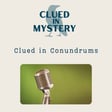
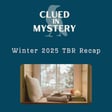

![[Re-release] Anthony Berkeley image](https://media.zencastr.com/cdn-cgi/image/width=112,quality=85/image-files/61e1c276e3ec42007857cff9/e7c778ac-a2ba-4809-9a5c-7cd39d167834.jpg)
![[Bonus] Wake Up Dead Man image](https://media.zencastr.com/cdn-cgi/image/width=112,quality=85/image-files/61e1c276e3ec42007857cff9/e276ac32-e664-464f-956c-7699bdb60aa5.jpg)
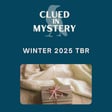

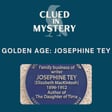
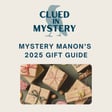
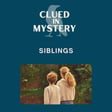

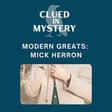

![[Bonus] Read Along: Daughter of Time image](https://media.zencastr.com/cdn-cgi/image/width=112,quality=85/image-files/61e1c276e3ec42007857cff9/b953ad72-c43e-48ca-a18a-b3c216ab90ee.jpg)

